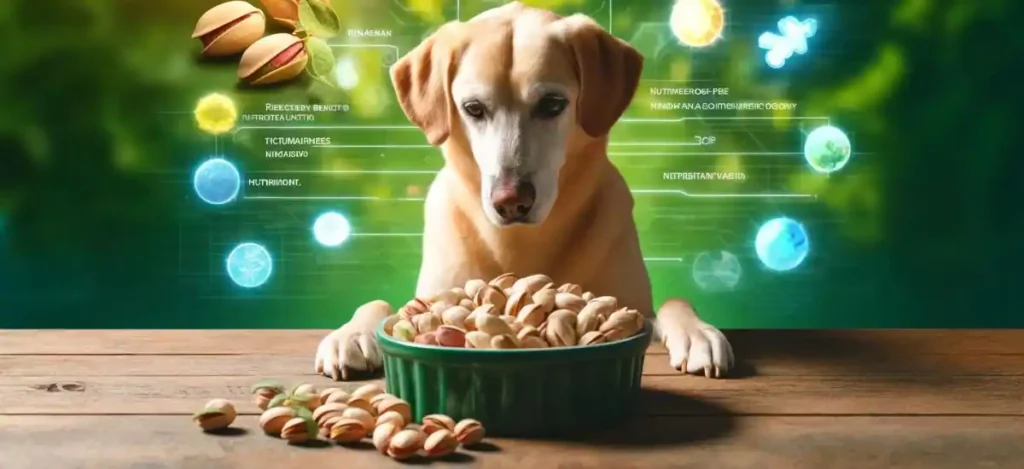Can dogs have pistachios? No, it is not recommended to feed pistachios to dogs. While these nuts are a hit at snack time for humans, sharing them with your four-legged friend comes with a few caveats. Pistachios are tasty and packed with nutrients, but not everything that’s good for us is good for our pets. Let’s crack into the details to ensure our furry pals stay safe and healthy.
Nutritional Overview of Pistachios
Pistachios aren’t just delicious; they’re also nutritious—for humans, that is. Here’s what they offer:
- Vitamins and Minerals: These nuts are a rich source of B vitamins, vitamin E, potassium, and magnesium.
- Antioxidants: Known for their antioxidant properties, pistachios can help fight free radicals in humans.
- Fiber: They provide a good amount of dietary fiber, which aids in digestion.
Each of these elements plays a crucial role in human health, but the benefits can translate differently for dogs.
Can Dogs Eat Pistachios?
The short answer is, it’s complicated. While pistachios are not toxic to dogs, they are not recommended due to several risks:
- Fat Content: High in fats, pistachios can be hard on a dog’s digestive system and may lead to pancreatitis.
- Calories: High caloric content can contribute to unhealthy weight gain in dogs.
- Salt and Seasonings: Often, pistachios sold in stores are salted or flavored, which is a no-go for doggy diets.
Risks Associated with Feeding Pistachios to Dogs
While the occasional pistachio might not spell disaster, regularly including them in your dog’s diet can lead to several health issues:
- Choking Hazard: Small and hard, pistachios can easily become choking hazards, especially for smaller dogs.
- Gastrointestinal Distress: Due to their high fat content, pistachios can cause stomach upset or even more severe conditions like pancreatitis.
- Toxicity from Mold: Pistachios can develop a mold that produces aflatoxin, which is toxic to dogs even in small amounts.
How to Safely Offer Pistachios to Dogs
If you still decide to give your dog a pistachio now and then, here’s how to do it safely:
- Unsalted and Unseasoned: Always choose pistachios that are plain and unsalted.
- Shell Removed: Never give your dog pistachios with the shell on to avoid choking.
- Moderation is Key: Only offer one or two pistachios occasionally to avoid health complications.
Remember, what’s a treat for you can be trouble for your pooch, so always prioritize their health and safety.
Signs of Pistachio Poisoning or Allergy in Dogs
Be vigilant for any signs of discomfort or illness after your dog eats pistachios:
- Allergic Reactions: Symptoms may include itching, swelling, or difficulty breathing.
- Signs of Gastrointestinal Distress: Watch for vomiting, diarrhea, or a lack of appetite.
- Behavioral Changes: Lethargy or unusual behavior can indicate that something is wrong.
Alternatives to Pistachios in a Dog’s Diet
If you’re looking for safer treat options for your dog, consider these alternatives that offer similar nutritional benefits without the risks:
- Carrots: A great source of fiber and beta-carotene, and most dogs love the crunchy texture.
- Green Beans: Low in calories and high in fiber, making them a perfect snack for weight management.
- Blueberries: Packed with antioxidants and fiber, they’re a safe and healthy treat in moderation.
These alternatives provide a nutritious snack without the risks associated with nuts like pistachios.
Frequently Asked Questions
Q1. Can dogs eat pistachio ice cream?
Ans: No, pistachio ice cream is not safe for dogs due to added sugars, artificial flavors, and lactose, which can be difficult for dogs to digest.
Q2. Are pistachio shells harmful to dogs?
Ans: Yes, pistachio shells can cause choking or intestinal blockages, so they should always be removed before considering pistachios as a treat.
Q3. How often can my dog eat pistachios?
Ans: Due to the risks outlined, it’s best to keep pistachio treats rare and minimal. Regular consumption is not recommended.
Conclusion
While pistachios are a tasty snack for humans, they pose several risks to dogs, making them a less-than-ideal treat. The potential for choking, gastrointestinal distress, and other health issues should make any pet owner think twice. For the health and safety of your furry friend, it’s best to stick with dog-safe treats that can provide similar nutritional benefits without the hazards.

